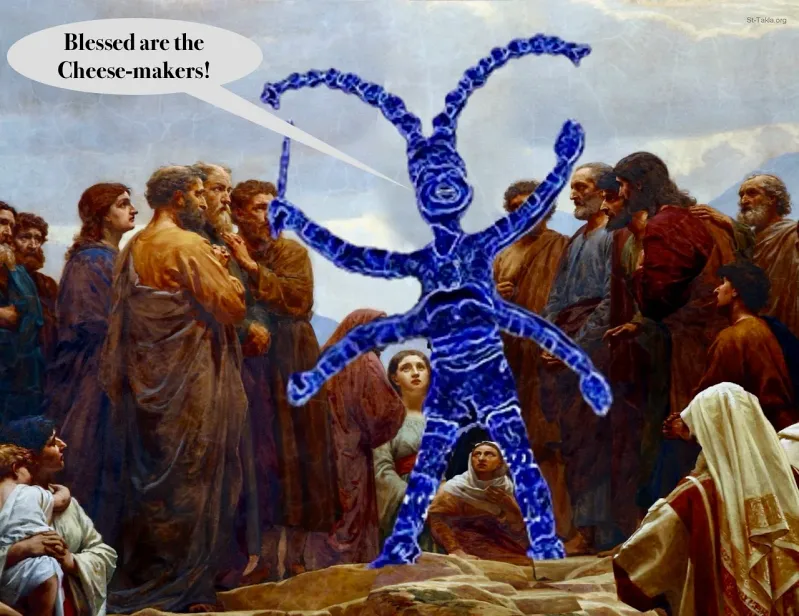Note: Daily, I am challenged by Christians to explain the logic in condemning all of them, and despite having answered this question in numerous articles, I again present this position as concisely as possible, primarily to provide too-lazy-to-read Christians a landing page for future inquiries.
Proper Philosophy
Every belief begins in philosophy, the discernment of truth, even religion. At some point, even if indoctrinated, the adherent must reconcile their values with the real world to avoid chaotic living and insanity. This analysis is the primary critical thinking provided by philosophy. Anyone who adopts or learns from birth Christianity must subsequently build a framework using the religion's values, inferring that any person absent cognitive impairment must accept, continue to accept, and utilize this knowledge to function with some degree of reason. This thought foundation applies to any belief system, whether based on science or religiosity. This thought foundation must rationally provide positive real-world answers to satisfy needs, problems, desires, etc. (Otherwise, why believe it?)
No one sane abides by the geocentric universe theory because rational inquiry and factual evidence prove this belief implausible. No sane or moderately educated person believes the earth's core is hollow and inhabited by dinosaurs or that aliens live on the moon since no plausible evidence exists. These examples exemplify logic and rationality's important purpose: to answer real-world questions. Philosopher Isaiah Berlin discusses this function as at least one of the field's purposes to obtain "plausible solutions."*
Metaphilosophy, the philosophy of philosophy, highlights the field's function by asking and answering questions concerning itself in the form of dialectics, Socratic method, and syllogisms as proofs, proving philosophy holds the crucial purpose to ascertain plausible explanations to satisfy needs, problems, desires, etc. This idea does not negate the field's metaphysical study, but clearly, there exists an overarching purpose to discern the plausible from the possible; otherwise, philosophy holds only the value of a thought exercise.
If an important function of philosophy is to answer questions most plausibly, then Christianity should be deemed implausible for failing to satisfy this requirement in a lack of evidence.
No ontological arguments provide plausible evidence of Christianity's God claim, history, or efficacy in solving social problems.
I cannot clarify this point better since ontological arguments such as intelligent design hold no substantive factual support. Even if they did, they still fail to prove Christianity plausibly. This point, made over and over again, should dismiss these arguments, but instead, they continue to haunt modern thinking as evidence for Christianity.
If a lack of rational evidence is not enough, the fact that Christianity fails when implemented in law and policy should dictate the religion's implausible nature. One of the most crucial points of Christian Pollution has been to highlight this failure concerning politics, social justice, and other areas of society in dozens of articles. (If Christians are too lazy to read them, they can find them summarized herein and in an open letter answering them.) If Christianity cannot solve problems or provide answers to pressing social needs (which it purports capability), then it serves no purpose.
Based on Christianity's implausibility and factual failure when applied in policy, culture, law, and personal living, I reject Christianity, and so should everyone since they have been fraudulently made to believe this religion and thereby defrauded of more effective ideas to govern thinking and life.
The Christian Fraud
There is no plausible evidence for the Christian God or the values imposed by this improbable religion. If there is no evidence, then presenting this religion as truth and, worse yet, embedding it into law and social policy forms a fraud. The only way to get people to believe this religion is to indoctrinate them as young as possible or to misstate the religion as a plausible reality, both actions forming deceptions.
Christians do not sit their children down and say, "Children, you should be aware we believe in a God with no factual evidence to support His existence, and the choice to believe is yours." Quite the opposite, children are indoctrinated with Christianity, either by family, church, schools (often by all three), and as young as possible to avoid education or experience giving them the ability to properly weigh facts. That action is a deception!
Anyone raised to believe Christianity has been deceived, and those raising their children to believe Christianity defraud their children of better reasoning skills that ultimately provide the desired plausible answers needed.
Likewise, proselytizing adults forms a deception also because the religion is not presented as an implausible idea but generally as a wonderful belief system or as an answer to someone or society's problems. Worsening this fraud is the fact that proselytizers often couch their preaching in pseudoscience to provide an air of authority and credibility.
Watch Ray Comfort explain Intelligent Design
Worse than just misleading with pseudoscience, Christian "philosophers" create elaborate, often philosophic jargon-filled, aporetic discussions divining the nature of Christian thought. Take, for example, a typical question meant to challenge Christians.
Why would a just and all-good God allow evil to exist?
A commonly found answer will often frame in this manner:
When discussing theodicy, we must distinguish between arguments of natural evil and moral evil since natural evil may exist as the result of creation, whereas moral evil presents a clear paradox in the just, all-loving God's will, having produced an antithetical state.
The question, meant to challenge the rational nature of a supposedly all-powerful, good God, becomes muddled by the Christian presenting the concept of "theodicy" (defense of God's good and omnipotence), complicating a simple question with jargon. Such responses you would expect to find in a religion or philosophy course, but they often appear in comments and forums by Christians who must argue philosophically to remain in the arena of possibility rather than plausibility because there is no plausible answer to the question. How can you give a plausible answer to the question of God's relationship with evil based on the implausible belief in God? You cannot because such discussions exist only in an assumption of God and in a conceptual framework of possibility, not reality. This form of arguing forms fraud when used as evidence or support for belief in God because no matter how elaborate and intelligent the argument posed, it is arguing nothing real but purports to be doing so. The fraudulence of Christian thinking deepens concerning these discussions because anyone presenting the idea of theodicy believes Christianity is real, thus defrauding themselves of the more plausible conclusions that theodicy is just nonsense born of their implausible religion. The fraud deepens further because, to defraud yourself or to logically argue these concepts as sensible notions, you must understand the opposing plausible arguments and ignore or present deceptive proofs, thus defrauding others.
Some of the best minds have no choice but to resort to such tactics, such as the mathematician and philosopher Gottfried Leibniz, who coined the term "theodicy" when trying to answer the question of the nature of evil and God. Leibniz ultimately explains this quandary as this world, with all its good and evil, must be the best world possible since God created it and no other world could be created better or worse in accordance with His divine standard.
How could a mathematician and philosopher arrive at this conclusion instead of theodicy being an implausible concept?
Readily one can imagine a better world, so this argument becomes a case of special pleading and other fallacies made by Leibniz because he believes the initial fraud that God is a plausible notion, thus defrauding himself of a more rational, plausible ideas concerning good and evil. Did Leibniz intentionally attempt fraud? Likely not. More probable, he simply could not solve the unrealistic argument (that persists today) and answered with a possibility opposed to a plausible solution, just like all Christians argue.
Unlike Leibniz, many so-called "Christian philosophers" often deliberately answer people using implausible, jargon-filled statements, not to prove or disprove anything but to give an air of authority and credibility, purposely perpetrating the fraud. You can see examples here, here, and here. They do this to bring the debate or conversation into the speculative world of possibilities to purposely allow for argument at the conceptual level, (the only place it can take place) knowing their ideas are implausible, thus perpetrating the Christian fraud.
Even if exonerated for deliberate deception, Christians still deceive people, especially when enforcing their values with the law. Christians legislating their beliefs is far less forgivable since they must argue against plausible evidence that counters their position. Take, for example, abortion banning, which has been opposed based on bodily autonomy rights. If you believe, as the Christians do, that life begins at conception and a child is a person with rights, you have no plausible argument to deny the woman her bodily autonomy upon which the child is dependent. A woman's autonomy is not a consideration for Christians who are perfectly willing to deny women the right to their bodies, as evidenced by their continuous opposition and overturning of Roe v. Wade.
When applied to real-world situations, all Christian reasoning breaks down in this manner because it is a fraud.
Christians make decisions this way due to having founded all their thinking on an implausible idea that forces deception to prove ideas. Seen clearly again in abortion's example, they cried baby murdering, inflated abortion numbers, and accused women of using abortion as contraception. In contrast to these lies, from the implementation of Roe v. Wade, abortion declined, thus showing that legalized abortion had the opposite effect of what Christians claim.
Founding thought on an implausible idea makes ideas proveable only through deception since they hold no firm reality.
Another example is contraception. Two billion dollars has been spent on the complete failure of Abstinence-Only Sex Education. Yet Christians continue to push this form of sex education for public schools. Why? Because their irrational beliefs tell them premarital sex is a sin despite almost none of them living by this value. Worse than not seeing their own inability to follow their principles, Christians must believe that by enforcing these values, they will somehow cause everyone to begin abiding by this value. (Why else enforce the beliefs?) Every Christian value implemented in policy miserably fails unless it is a universal value such as "not murdering people."
Ignoring evidence and continuing to believe implausible ideas can only occur by deceiving oneself and or others, thus defrauding themselves and others of more plausible and beneficial answers.
The Liberal Christian
Christians argue I paint them all with the same brush of bias since not all Christians think this way or those Christians pushing fraudulent ideas are not the real Christians. They claim a great diversity exists amongst them that makes grouping them tantamount to prejudice or stereotyping. I have discussed this point many times, most notably in Christian Pollution: Polemic & Absurdities, which in multiple essays shows the falseness of this belief. Only a mind tricked into believing an implausible idea could make this argument. The only diversity amongst Christians stems from their interpretation of their bibles, Jesus, and God.
Commonalities between major Christian Sects:
- They oppose abortion.
- They oppose contraception.
- All have some form of purity culture belief.
- They want to control sexuality.
- They believe women and men are binary entities.
- They look to scripture for guidance.
- They believe in Jesus.
- The list goes on and on…
Are there Christians who warped their minds into believing the exact opposite of these common Christian beliefs? YES!
Not only do some Christians believe the exact opposite of their majority, but they can also justify any bizarre values, such as having sex with children, as in the case of the cult, The Family. Less radically, believers at a personal level often oppose common Christian beliefs. These are the liberal Christians who have no unity and no consistent doctrine. Abiding by the whim of their beliefs and arbitrary interpretations of the scripture, they voice the façade of the Christian liberal, arguing against hardline Christian factions and promoting the idea of Christian diversity. While allying with these liberal Christians might seem wise, doing so supports the Christian fraud. Ask yourself: who are these liberal Christians?
The truest of them might be sects like the Episcopal church, where 83% of members felt homosexuals should be included in the church, yet liberal Christianity rarely distinguishes so clearly, with liberals often sitting alongside conservatives in the same churches. This reality brings into question: what exactly constitutes liberal Christianity?
What one Christian deems liberal can be a far cry from another Christian's view.
A liberal Catholic might see abortion as bad, but not in instances of rape. Another might desire abortion banned entirely but see homosexuality as acceptable. This personal sculpting of Christian views makes liberal Christianity a misnomer since there is little consistency in values. (It also explains why they have no unity to oppose their more conservative brethren.)
What is consistent amongst liberal Christians is the belief in Jesus, the bible, and God; however interpreted, and just believing Christianity perpetrates a fraud. Even if someone quietly believes Christianity and keeps this wisdom to themselves, they defraud themselves of better plausible beliefs. If they profess the religion as truth, they commit fraud. Worse than any other aspect, liberal Christianity is a fraud itself because it camouflages Christianity with diversity, credibility, and plausibility when it is actually an à la carte belief prepared from the same preposterous possibility.
Liberal Christians might be the most duplicitous believers for falsely promoting Christianity as a plausible, effective problem-solving belief system.
Christianity fails to prove plausible, and declaring itself plausibly true, forms fraud. More than just lacking plausibility and lying, the factual evidence of Christianity's failure stares us in the face with mountains of evidence from failed social policies, flawed doctrines, and being so malleable as to form countless personal interpretations and sects diametrically opposed to one another - none holding any plausible answers and instead endangering the believer.
Isaiah Berlin Concepts and Categories: Philosophical Essays - Second Edition 2nd Edition, Princeton University Press; 2nd edition (November 10, 2013 Kindle Edition Original photo by Jonathan Sanchez on Unsplash
Original photo by Jonathan Sanchez on Unsplash
































































































